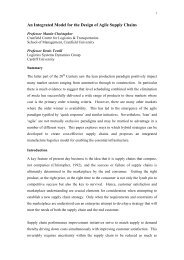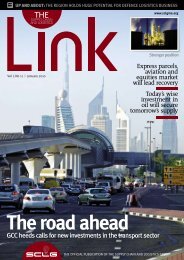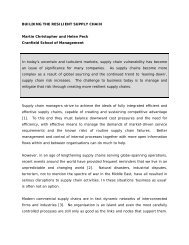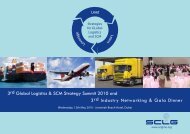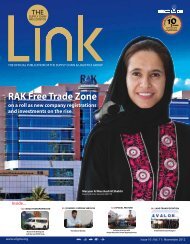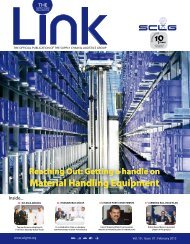Free to Download - SCLG
Free to Download - SCLG
Free to Download - SCLG
- TAGS
- download
- sclg
- sclgme.org
Create successful ePaper yourself
Turn your PDF publications into a flip-book with our unique Google optimized e-Paper software.
Last year, the INSEAD eLab’s study in<strong>to</strong><br />
innovation skills in Europe showed that the<br />
EU was facing some difficulties and urgent<br />
attention would be needed if it were <strong>to</strong><br />
benefit from technological innovation and<br />
investment.<br />
Based on its skills pyramid and three<br />
years of data, the eLab team updated<br />
the scores for some 55 countries: the 27<br />
member countries of the European Union,<br />
20 countries from the Asia-Pacific region,<br />
and eight other countries which compete<br />
with EU and Asia.<br />
In addition, it also examined which<br />
countries had improved their scores over<br />
the past three years when the financial crisis<br />
was at its height, and those which have seen<br />
their scores weaken in that period.<br />
“Singapore is an excellent example of a<br />
country that continues <strong>to</strong> invest in all three<br />
levels of skills: basic literacy, occupational<br />
skills and global knowledge skills”, says<br />
Nils Olaya Fonstad, Associate Direc<strong>to</strong>r of<br />
INSEAD’s eLab.<br />
The eLab report identifies four types<br />
of countries: ‘solid leaders’ (countries with<br />
high scores for skills which kept improving);<br />
‘leaders at risk’ (countries that scored above<br />
average but whose scores have declined<br />
over the past three years); ‘potential leaders’<br />
(countries that are still below average but<br />
who are getting stronger); and countries<br />
which are struggling.<br />
Solid leaders include Singapore, Australia<br />
and New Zealand in the Asia-Pacific region,<br />
and the Czech Republic and Cyprus in<br />
Europe. As for countries at risk of losing<br />
their leading positions, these include South<br />
Korea, Taiwan, Japan in Asia, as well as<br />
Finland, Sweden, Germany, France, the<br />
Netherlands, the UK and Ireland in Europe.<br />
Among the potential leaders are<br />
China, Vietnam and Sri Lanka in Asia, and<br />
Luxemburg, Poland and Romania in Europe.<br />
The initial study came about in response<br />
<strong>to</strong> a request from the IT sec<strong>to</strong>r, as Lanvin<br />
27<br />
member countries of the<br />
European Union, 20 countries<br />
from the Asia-Pacific region,<br />
and eight other countries<br />
compete with the EU and Asia<br />
points out: “Some large companies came<br />
<strong>to</strong> INSEAD and said ‘we want <strong>to</strong> invest in<br />
Europe, but we don’t find enough people<br />
who would be programmers, engineers,<br />
scientists. What can be done about it?<br />
Should we expect <strong>to</strong> face the same situation<br />
in 10 years from now? Are governments<br />
going <strong>to</strong> take specific measures, or should<br />
we the private sec<strong>to</strong>r start getting our act<br />
<strong>to</strong>gether and churn out more of these skills<br />
internally?’”<br />
The INSEAD research centre began<br />
investigating the issue and found it didn’t<br />
make sense <strong>to</strong> consider IT skills in isolation<br />
– hence the pyramid, Lanvin says, which<br />
also takes in<strong>to</strong> account basic literacy as well<br />
as key knowledge skills which are “required<br />
for innovation, and not just technological and<br />
IT innovation, just <strong>to</strong> produce the innovative<br />
mindsets that economies will need <strong>to</strong><br />
compete in this century.”<br />
“Increasingly, what we’ve seen over the<br />
last couple of decades, is that infrastructure,<br />
like telecommunication infrastructure and<br />
connectivity, is key”, says Lanvin. “At the<br />
same time, he adds, without the related<br />
GREEN ENERGY PROGRAM PARTICIPATION BY REGION<br />
Management<br />
INFOCUS<br />
skills, infrastructure in itself would not bring<br />
about the right business environment”.<br />
“It has often been said, for instance,<br />
that, in the 1960s, countries like Korea and<br />
Ghana had about the same income per<br />
capita. A few decades later, the multiplier<br />
was between eight and 10 <strong>to</strong> the advantage<br />
of Korea. And people tend <strong>to</strong> focus on<br />
broadband, saying ‘yes, this is a country that<br />
has developed its IT sec<strong>to</strong>r’, forgetting that<br />
indeed the skills and education component<br />
has been absolutely key for Korea <strong>to</strong> take<br />
advantage of this massive investment.”<br />
This is why it’s now a cause for concern<br />
that, according <strong>to</strong> eLab’s data, skills in Korea<br />
are deteriorating because, as Lanvin says,<br />
the authorities there “know that it’s a primary<br />
condition for creating the right environment<br />
for investment and growth.”<br />
Another good example of the dynamics<br />
involved is India, which is seen as struggling<br />
(albeit a borderline leader at risk). Fonstad<br />
points out that for decades it has been<br />
investing in the development of skills <strong>to</strong><br />
attract foreign investment <strong>to</strong> sec<strong>to</strong>rs such<br />
as ICT.<br />
January 2011 Link<br />
43



